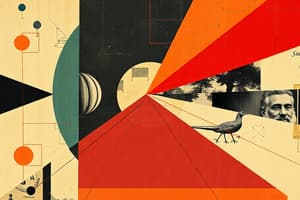Podcast
Questions and Answers
Which set operation results in elements common to both sets?
Which set operation results in elements common to both sets?
- Complement
- Union
- Intersection (correct)
- Difference
What is the result of the union operation on sets A = {1, 2, 3} and B = {3, 4, 5}?
What is the result of the union operation on sets A = {1, 2, 3} and B = {3, 4, 5}?
- {1, 2, 3}
- {1, 2, 3, 3, 4, 5}
- {3, 4, 5}
- {1, 2, 3, 4, 5} (correct)
If A = {1, 2, 3} and B = {3, 4, 5}, what is A ∩ B?
If A = {1, 2, 3} and B = {3, 4, 5}, what is A ∩ B?
- {1, 2, 3}
- {5}
- {3} (correct)
- {4}
What is the difference between sets A = {1, 2, 3} and B = {3, 4, 5} denoted as A - B?
What is the difference between sets A = {1, 2, 3} and B = {3, 4, 5} denoted as A - B?
Which set operation combines all elements from two sets without repetition?
Which set operation combines all elements from two sets without repetition?
If set A = {x, y} and set B = {y, z}, what is A ∩ B?
If set A = {x, y} and set B = {y, z}, what is A ∩ B?
What is the complement of the set {2, 3, 4} if the universal set is U = {1, 2, 3, 4, 5}?
What is the complement of the set {2, 3, 4} if the universal set is U = {1, 2, 3, 4, 5}?
In propositional logic, what does the symbol '' represent?
In propositional logic, what does the symbol '' represent?
If A = {1, 2, 3} and B = {3, 4, 5}, what is A B?
If A = {1, 2, 3} and B = {3, 4, 5}, what is A B?
Which logic branch quantifies over individuals or properties?
Which logic branch quantifies over individuals or properties?
In logic, what does the symbol '' represent?
In logic, what does the symbol '' represent?
Flashcards
Set
Set
A collection of distinct objects.
Set Element
Set Element
An individual object within a set.
Set Union
Set Union
Combines all elements from two sets, including duplicates.
Set Intersection
Set Intersection
Signup and view all the flashcards
Set Difference
Set Difference
Signup and view all the flashcards
Set Complement
Set Complement
Signup and view all the flashcards
Propositional Logic
Propositional Logic
Signup and view all the flashcards
Proposition
Proposition
Signup and view all the flashcards
Predicate Logic
Predicate Logic
Signup and view all the flashcards
Universal Quantifier
Universal Quantifier
Signup and view all the flashcards
Existential Quantifier
Existential Quantifier
Signup and view all the flashcards
Study Notes
Discrete Mathematics: Focusing on Sets and Logic
Introduction
Discrete mathematics is a branch of mathematics that focuses on discrete objects, such as integers, graphs, and finite structures. It combines elements of various branches of mathematics, including algebra, geometry, topology, logic, and combinatorics, to form a coherent framework for solving problems in computational sciences, engineering, and other disciplines. Two fundamental aspects of discrete mathematics are sets and logic.
Sets
A set is a collection of distinct objects, often denoted by capital letters like {A, B, C}. The objects in a set are called its elements. A set can contain elements of any type, including numbers, symbols, or even other sets. Set operations include union, intersection, difference, and complement.
Union
The union of two sets, denoted as A ∪ B, contains all the elements that are present in either set A or set B.
Example: {1, 2, 3} ∪ {3, 4, 5} → {1, 2, 3, 4, 5}
Intersection
The intersection of two sets, denoted as A ∩ B, contains only the common elements that are present in both sets A and B.
Example: {1, 2, 3} ∩ {3, 4, 5} → {3}
Difference
The difference of two sets, denoted as A - B or B - A, contains elements that are present in A but not in B, or vice versa.
Example: {1, 2, 3} - {3, 4, 5} → {1, 2}
Complement
The complement of a set, denoted as A', contains all the elements from the universal set that are not part of set A.
Example: Let U = {1, 2, 3, 4, 5}. Then {1, 2, 3}' = {4, 5}
Logic
Logic is the branch of mathematics concerned with studying arguments and their structures. Its primary goal is to find arguments that yield true conclusions whenever the premises are true. There are two major types of formal logic: propositional logic and predicate logic.
Propositional Logic
In propositional logic, propositions are statements that can be either true or false. Using connectives like negation ¬, conjunction ∧, disjunction ∨, and implication →, we can combine propositions to build more complex ones.
Predicate Logic
In predicate logic, propositions can be quantified over things, such as individuals or properties. Quantifiers include universal ∀ and existential ∃.
Conclusion
Understanding the basics of set theory and logic is essential for navigating the world of discrete mathematics. As discrete mathematics continues to play a crucial role in modern computing systems, understanding these foundations becomes increasingly important for anyone interested in pursuing careers in computer science, mathematics, or related fields.
Studying That Suits You
Use AI to generate personalized quizzes and flashcards to suit your learning preferences.




